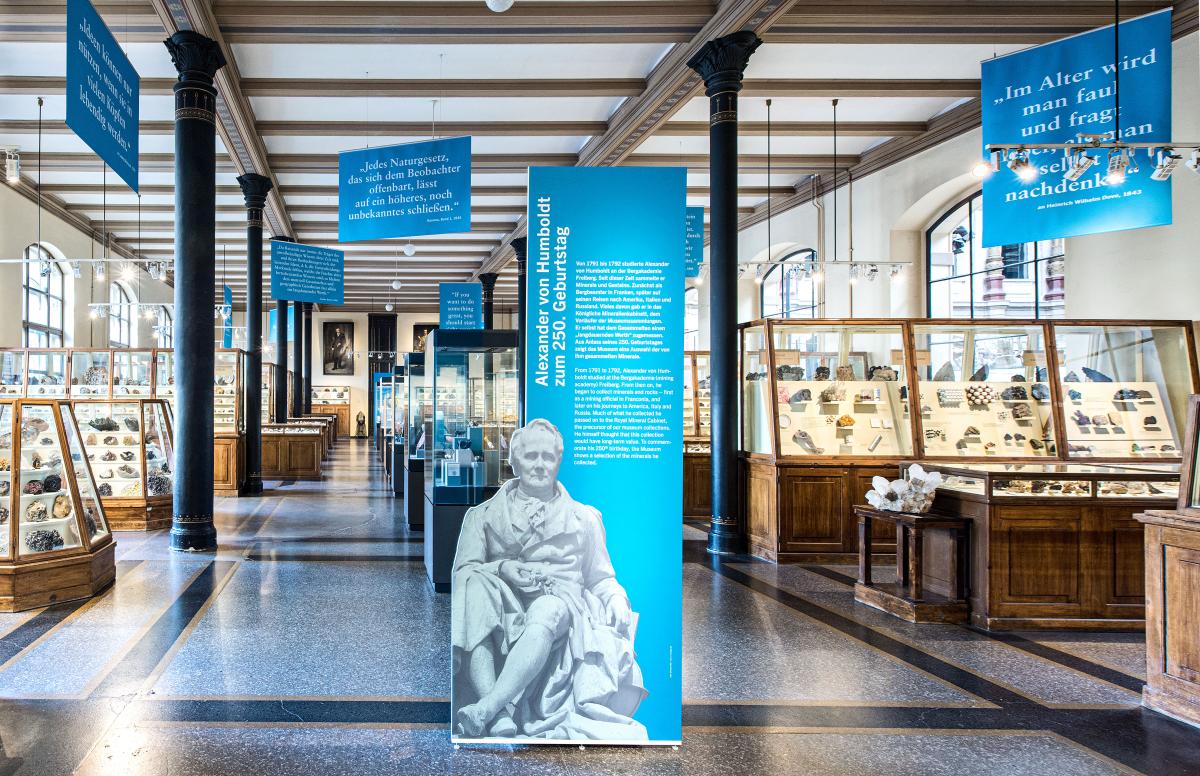Alexander von Humboldt was born in Berlin 250 years ago on 14 September - a good reason to explore the Museum für Naturkunde Berlin in the footsteps of the natural scientist on 14 & 15 September 2019 with free admission under the motto "Humboldt for all!” As a global research infrastructure, the museum's research collection is a unique scientific and cultural treasure trove of knowledge that is researched by its own and international experts and made accessible worldwide. These include the collections that Alexander von Humboldt has collected on his travels or received through a global network. An extensive programme invites visitors to discover a Humboldt pet during a guided tour of the collections, to decipher Humboldt's handwriting in the Museum Archive, to trace his passion for stones or to go on a journey to Siberia.
"How can we get people, especially the young and committed generation, enthusiastic about nature, politics and society? How can we actively shape our future and what guides us? For me, this is the legacy of Alexander von Humboldt," says Johannes Vogel, Director General of the Museum für Naturkunde Berlin. "The study of nature, the enthusiasm for nature is a key to this. With our numerous programmes, we are creating a place for exchange, participation and dialogue".
Intervention
More than 1100 objects, mainly minerals and rocks, were brought to the museum by Alexander von Humboldt. A "Humboldt Intervention" on the occasion of the 250th birthday shows selected original objects in the Mineraliensaal. The intervention can be seen until February 2020.
Program (in German)
Sat, 14.09.
Guided tour: Alexander Humboldt und das Museum für Naturkunde
2:00, 3:00 pm
Guided tour: Alexander von Humboldt – Spurensuche in der mineralogischen Sammlung
2:30, 3:30, 4:30 pm
Guided tour: Können Sie es lesen? Schriften Humboldts und seiner Zeitgenossen im Museumsarchiv
3:30 pm
Sun, 15.09.
Guided tour: Alexander von Humboldt – Spurensuche in der mineralogischen Sammlung
10:30, 13:00, 14:00, 15:00 Uhr
Lesson: „Auf den Spuren von Alexander von Humboldt in Sibirien“
11:30 am
Guided tour: Können Sie es lesen?
Schriften Humboldts und seiner Zeitgenossen im Museumsarchiv
2:00 pm
Guided tour: Alexander Humboldt und das Museum für Naturkunde
2:30, 3:30 pm
A book published by the Museum für Naturkunde Berlin on the occasion of the 250th birthday of A. v. Humboldt is available in the museum shop (in German):
Alexander von Humboldt
Minerale und Gesteine im Museum für Naturkunde Berlin
Hg. von Ferdinand Damaschun und Ralf Thomas Schmitt
424 S., 504 farb. Abb., Klappenbroschur
34,90 € (D); 35,90 € (A)
ISBN 978-3-8353-3582-0
What the Museum für Naturkunde Berlin and Alexander von Humboldt have in common
Alexander v. Humboldt was a Berliner. He was the first cosmopolitan scientist in Germany with an international research network that knew no boundaries between the humanities and natural sciences. As a globetrotter and thinker of globality, he has shown how science can penetrate from the ivory tower into the consciousness of society. With its work as an opening, integrated, globally acting research institute, as a place of lifelong learning and as a dialogue partner for nature, science and education, the Museum für Naturkunde Berlin acts in his spirit. Alexander von Humboldt was willing to take risks, he was politically thinking, acting and responsible. His view of nature paved the way for ecological and sustainable awareness and responsible use of natural resources. In his sense, the Museum für Naturkunde Berlin is increasingly involved as a mediator and advisor in current social debates, e.g. on the issues of resource scarcity, climate change and biodiversity loss. The life's work of A. v. Humboldt and the work of the Research Museum form a symbiosis: enthusiasm, fascination, research, mediation and education, social commitment - for nature. This is why Alexander von Humboldt's handwriting is integrated into the logo of the Museum für Naturkunde Berlin.
